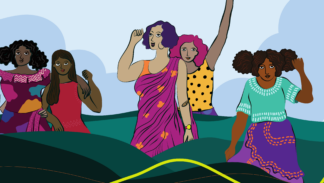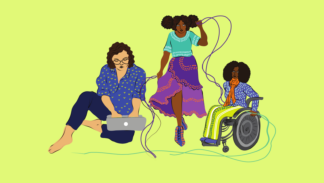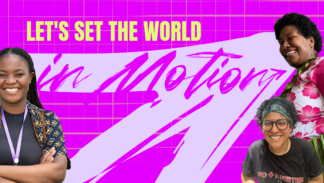October Letter from Latanya: On getting honest with our history and moving forward for change
Friends,
Last month, Global Fund for Women held a week-long, organization-wide retreat to step away from the day-to-day and to think critically about how to best meet the urgency of today’s fight for gender justice. We continue to work to be stronger and more audacious in our vision and strategy in support of movements that are intergenerational, intersectional, and interconnected.
We were buoyed by the over 7 million people who marched for climate justice ahead of the UN Climate Action Summit, demanding urgent action from the streets of Jakarta to Kampala to San Francisco, where we were meeting. Among the young leaders were indigenous women and girls who have long been fighting at the intersection of environmental and indigenous rights. These include the inspirational Quannah Chasinghorse, who at just 17 years old helped win protections for the Arctic National Wildlife Refuge.
I’ve been reflecting on the importance of centering indigenous women and girls and the indigenous rights movements as we mark October 14, Indigenous People’s Day. Originally known as Columbus Day in the United States, the movement to reclaim this history demands that we be clear about our past and truthful about the violent colonial founding of this nation and of the impacts of worldwide colonization on indigenous people.
Supporting indigenous feminist organizing around the globe is integral to the fight for gender justice. Indigenous women are working to protect sacred land in Hawaii, mobilizing for their land rights in Brazil and organizing to stop dangerous oil pipelines in Canada. One of the groups we fund is currently organizing against corporate megaprojects on indigenous land in Mexico. “Our lives are at stake,” Bettina Cruz, a land defender and member of the group Comité de Mujeres de la Asamblea de Pueblos Indígenas del Istmo en Defensa de la Tierra y el Territorio, told us. “We have a territory that is very important for that way of living, for our nutrition, for our rituals, for our economic activities, for everything. Therefore, land grabbing takes away our essence, our lives.”
We recently jointly created a bold framework for Beijing +25 called “Women Radically Transforming a World in Crisis,” which calls out capitalism and colonization as critical, structural obstacles to gender justice and women’s human rights. It is explicit in describing the challenges that indigenous women face as a result of these obstacles and the importance of fighting alongside indigenous communities for indigenous land rights, access to and control of natural resources, and autonomy in governance.
As my colleagues and I at Global Fund for Women continue to reflect on our role in supporting movements, we take seriously the importance of truthful history, recognition of structural obstacles, and focusing on the most impacted and marginalized communities around the globe. Join us this month as we celebrate the leadership of girls on International Day of the Girl, plan next steps for climate justice, and mark Indigenous People’s Day. Follow us on social media, donate to our movement building efforts, take a moment to reflect on indigenous women and girls’ struggles and victories, or join onto the Beijing +25 framework.
Latanya Mapp Frett


